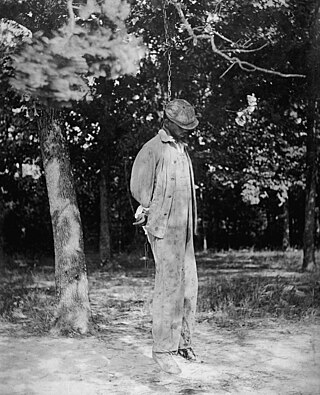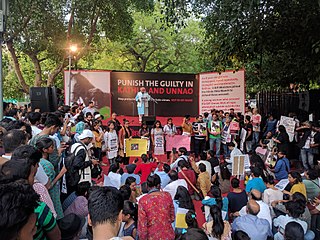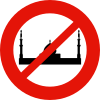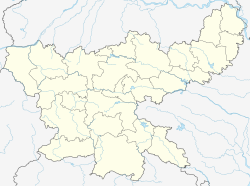
Lynching is an extrajudicial killing by a group. It is most often used to characterize informal public executions by a mob in order to punish an alleged transgressor, punish a convicted transgressor, or intimidate people. It can also be an extreme form of informal group social control, and it is often conducted with the display of a public spectacle for maximum intimidation. Instances of lynchings and similar mob violence can be found in every society.

The 2002 Gujarat riots, also known as the 2002 Gujarat violence, was a three-day period of inter-communal violence in the western Indian state of Gujarat. The burning of a train in Godhra on 27 February 2002, which caused the deaths of 58 Hindu pilgrims and karsevaks returning from Ayodhya, is cited as having instigated the violence. Following the initial riot incidents, there were further outbreaks of violence in Ahmedabad for three months; statewide, there were further outbreaks of violence against the minority Muslim population of Gujarat for the next year.
Atiq Ahmed was a notorious Indian gangster and politician. He served as a member of the Indian Parliament and the Uttar Pradesh Legislative Assembly from the Samajwadi Party. Ahmed had more than 160 criminal cases registered against him and competed in several elections from jail. As of March 2023, the Uttar Pradesh Police had seized properties worth ₹11,684 crore (US$1.5 billion) belonging to Ahmed and his family. In 2019, he was convicted of kidnapping a witness who testified against him regarding the 2005 murder of his political rival Raju Pal. Ahmed remained in jail until his assassination by three gunmen on his way to a court-mandated medical checkup on 15 April 2023.

Jai Shri Ram is an expression in Indic languages, translating as "Glory to Lord Rama" or "Victory to Lord Rama". The proclamation has been used by Hindus as a symbol of adhering to Hindu faith, or for projection of varied faith-centered emotions.
The Shree Ram Sena, or Shree Ram Sena, is a right-wing Hindutva group founded & headed by Pramod Muthalik. It has received media attention for its acts of moral policing, including the 2009 Mangalore pub attack.

The Gulbarg Society massacre took place on 28 February 2002, during the 2002 Gujarat riots, when a crowd started stone pelting the Gulbarg Society, a Muslim neighbourhood in the eastern part of Chamanpura, Ahmedabad in the Indian state of Gujarat. Most of the houses were burnt, and at least 35 victims, including a former Congress Member of Parliament, Ehsan Jafri, were burnt alive, while 31 others went missing after the incident, later presumed dead, bringing the total deaths to 69.

Ajay Mishra Teni is a politician and a Member of Parliament in the 17th Lok Sabha. He is the current Minister of State in Ministry of Home affairs, Government of India. He represents the Kheri constituency of Uttar Pradesh and is a member of the Bharatiya Janata Party political party.
The Mohsin Sheikh murder was the lynching of Mohsin Shaikh in Pune on 2 June 2014. Communal tensions followed public awareness of derogatory photographs of Maratha king Shivaji and Shiv Sena founder Bal Thackeray uploaded to social media. Public buses were vandalized and arrests were made. The uploads were made through foreign proxy servers traced to sources in India. Home minister R R Patil said authorities know who uploaded the images and that Mohsin was innocent and died in the riots. The Government of Maharashtra announced compensation to his family. Before this, Nikhil Tikone of Kasba Peth was targeted by Hindus as a photo of him spread via whatsapp saying he was "Nihal Khan" during communal tensions. Muslims too attacked him believing that he was associated with RSS.
2016 Jharkhand mob lynching refers to the case of lynching of three Muslim cattle traders by allegedly cattle-protecting vigilantes in Balumath forests of Latehar district in the Indian state of Jharkhand on 18 March 2016. The attackers killed 32 year old Mazlum Ansari and 12 year old Imtiaz Khan who were both found hanging from a tree.

The 2017 Alwar mob lynching was the attack and murder of Pehlu Khan, a dairy farmer from Nuh district of Haryana, allegedly by a group of 200 cow vigilantes affiliated with right-wing Hindutva groups in Behror in Alwar, Rajasthan, India on 1 April, 2017. Six others who were with Pehlu Khan were also beaten by the cow vigilantes.
Cow vigilante violence is a pattern of mob-based collective vigilante violence seen in India. The attacks are perpetuated by Hindu nationalists against non-Hindus to protect cows, which are considered sacred in Hinduism.

The Kathua rape case involved the abduction, gang rape, and murder of an 8-year-old Muslim girl, Asifa Bano, by seven Hindu males, six men and a juvenile, in January 2018 in the Rasana village near Kathua in Jammu and Kashmir, India. A chargesheet for the case was filed, the accused were arrested and the trial began in Kathua on 16 April 2018. The victim belonged to the nomadic Bakarwal community, and the crime was a bid to terrorise the group off Jammu. She disappeared for a week before her body was discovered by the villagers a kilometer away from the village. The incident made national news when charges were filed against eight men in April 2018. The arrests of the accused led to protests by the Panthers Party and other local groups, who sought justice for the victim. The gang rape and murder, as well as the support the accused received especially from local officials of the Bharatiya Janata party, sparked widespread outrage in India and world-wide.

The 2020 Delhi riots, or North East Delhi riots, were multiple waves of bloodshed, property destruction, and rioting in North East Delhi, beginning on 23 February 2020 and brought about chiefly by Hindu mobs attacking Muslims. Of the 53 people killed, two-thirds were Muslims who were shot, slashed with repeated blows, or set on fire. The dead also included over a dozen Hindus, who were shot or assaulted. More than a week after the violence had ended, hundreds of wounded were languishing in inadequately staffed medical facilities and corpses were being found in open drains. By mid-March many Muslims had remained missing.
On 16 April 2020, a vigilante group lynched two Hindu Sadhus and their driver in Gadchinchale Village, Palghar District, Maharashtra, India. The incident was fuelled by WhatsApp rumours of thieves operating in the area during the countrywide coronavirus lockdown. The vigilante group of villagers had mistaken the three passengers as thieves and killed them. Policemen who intervened were also attacked; four policemen and a senior police officer were injured.
The 2017 Jharkhand mob lynchings were cases of mob lynching that took place in May 2017 in Kolhan division, Jharkhand, India. At least nine people were killed, including 4 Muslim cattle traders, in four different incidents.
The 2015 Dadri lynching refers to case of lynching in which a mob of villagers attacked the home of 52 year-old Mohammed Akhlaq, killing him, for suspicion of slaughtering a cow. The attack took place at night, on 28 September 2015 in Bisahda village, near Dadri in Uttar Pradesh, India. The mob consisting of local villagers, attacked Akhlaq's house with sticks, bricks and knives, saying that they suspected of him stealing and slaughtering a cow calf.
A Hindu–Muslim clash occurred in Delhi's Jahangirpuri area on 16 April 2022, in the midst of a Hindu procession on the occasion of Hanuman Jayanti. The clash took place during the last of three processions organised that day by Bajrang Dal, a militant right wing Hindu nationalist organization. The procession, whose members were reportedly brandishing swords and pistols, halted near a mosque where Muslims were holding Ramadan prayers, while blasting music from loudspeakers and shouting abusive slogans. A conflict broke out, during which both groups pelted the other with stones and other objects; a few shots were fired as well. A number of people were injured, including a police officer. Twenty three people were arrested, including two juveniles.
The lynching of Deben Dutta happened on 31 August 2019 when the Teok Tea Estate hospital of Jorhat district in Assam was attacked by a mob of tea garden workers angry that treatment delays had caused the death of a worker.
In August and September 2022, Leicester, England, saw a period of religious and ethnic tension between predominately British Hindus and British Muslims of South Asian origin. The unrest saw rioting, protest marches, sloganeering and ethnic violence between the two populations. It was also preceded by social media campaigning, misinformation and hate propaganda. Muslim apprehensions of what they alleged as "Hindutva fascism" entering their neighbourhoods was evidently the main driver behind the unrest, Subsequent independent investigations found Hindu places of worship were desecerated, and Hindu men specifically targeted by mobs. Muslim community leaders and analysts point to the Indian celebrations following the India–Pakistan 2022 Asia Cup match on 28 August as a catalyst, which saw a reaction from Pakistani fans.












